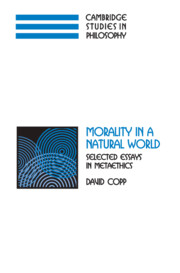Book contents
- Frontmatter
- Contents
- Preface
- Acknowledgments
- Introduction
- Part One Naturalism: Epistemology and Metaphysics
- 1 Why Naturalism?
- 2 Four Epistemological Challenges to Ethical Naturalism: Naturalized Epistemology and the First-Person Perspective
- 3 Moral Naturalism and Self-Evident Moral Truths
- 4 Moral Necessities in a Contingent World
- Part Two Referring to Moral Properties
- Part Three Naturalism and Normativity
- Index
- References
2 - Four Epistemological Challenges to Ethical Naturalism: Naturalized Epistemology and the First-Person Perspective
Published online by Cambridge University Press: 19 July 2009
- Frontmatter
- Contents
- Preface
- Acknowledgments
- Introduction
- Part One Naturalism: Epistemology and Metaphysics
- 1 Why Naturalism?
- 2 Four Epistemological Challenges to Ethical Naturalism: Naturalized Epistemology and the First-Person Perspective
- 3 Moral Naturalism and Self-Evident Moral Truths
- 4 Moral Necessities in a Contingent World
- Part Two Referring to Moral Properties
- Part Three Naturalism and Normativity
- Index
- References
Summary
Ethical naturalism is the doctrine that moral properties, such as moral goodness, justice, rightness, and wrongness, are among the ‘natural’ properties that things can have. It is the doctrine that moral properties are ‘natural’ and that morality is in this sense an aspect of ‘nature.’ Accordingly, it is a view about the semantics and metaphysics of moral discourse. For example, a utilitarian naturalist might propose that wrongness is the property an action could have of being such as to undermine overall happiness, where happiness is taken to be a psychological property. Unfortunately, it is unclear what the naturalist means by a ‘natural’ property. For my purposes in this chapter, I shall assume that natural properties are such that our knowledge of them is fundamentally empirical, grounded in observation. More precisely, a property is ‘natural’ just in case any synthetic proposition about its instantiation can be known only a posteriori, or with the aid of experience. Ethical naturalism is, in short, the doctrine that there are moral properties and that they are natural properties. It implies that moral knowledge is fundamentally empirical. It is committed to a broadly ‘empiricist’ moral epistemology.
This chapter springs from the fact that certain unsurprising commonsense first-personal observations about our moral thinking can appear to undermine ethical naturalism by undermining the plausibility of the idea that our moral knowledge is empirical.
- Type
- Chapter
- Information
- Morality in a Natural WorldSelected Essays in Metaethics, pp. 55 - 92Publisher: Cambridge University PressPrint publication year: 2007



